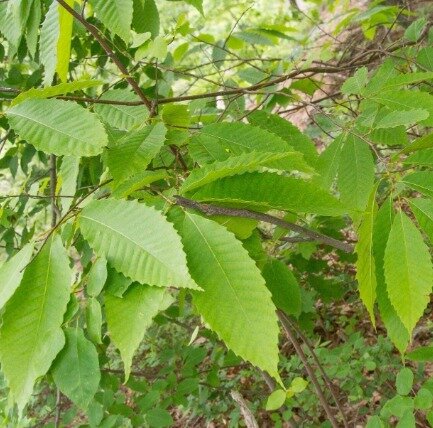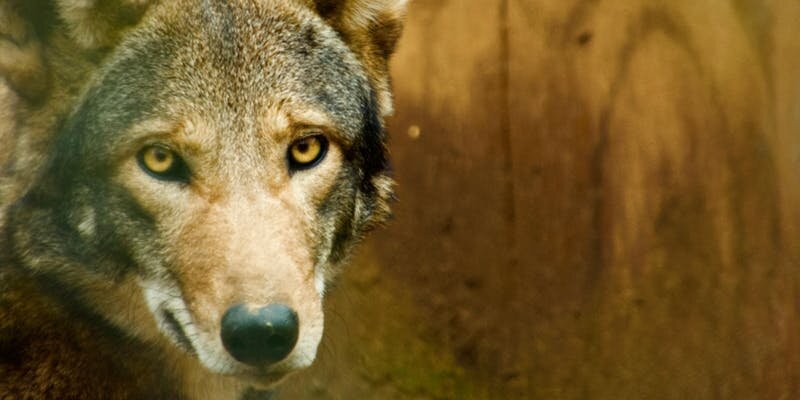Research at Reflection Riding
We're always engaging in research projects that not only expand our scientific knowledge but also provide opportunities for education.
If you are a researcher or a student who has a research project that involves conservation, biology, wildlife management, or other appropriate topics, consider Reflection Riding Arboretum & Nature Center. Our staff is eager to assist with your research needs.
American Chestnut
(Castanea dentata)
Reflection Riding Arboretum and Nature Center is proud to play an active role in the restoration of the American chestnut (Castanea dentata). Through a partnership with the Tennessee Chapter of The American Chestnut Foundation (TACF), we are a part of the nationwide backcross breeding program designed to breed disease resistance to chestnut blight (Cryphonectria parasitica) and phytophthora root rot (Phytophthora cinnamomi).
The small but active chestnut orchard here on the property consists of advanced hybrid trees expected to harbor resistance to those diseases. Each summer, TACF researchers visit the orchard to collect pollen in order to make crosses (pollinate) other trees in this orchard and throughout the state.
Although there is much more work to be done, with the help of organizations like ours, TACF is making progress towards the restoration of a cultural and ecological giant.
Photo (c) Erik Danielsen, some rights reserved (CC BY-NC)
Save the American Red Wolf
The American Red Wolf is the most endangered canid in the world with approximately 27 individuals in one wild recovery area in northeastern North Carolina and a captive population among participating institutions. The American Red Wolf population began declining over many years from predator control programs, human interactions, and habitat loss. In 1980, the American Red Wolf was declared extinct in the wild. In 1987, through captive breeding efforts, the American Red Wolf was re-established in the wild.
Photo by Reflection Riding volunteer and environmental arts and humanities student Henri Bonner.
Red Wolf Semen Collection
One of the goals for endangered species conservation efforts is that every genetically valuable animal is represented in the next generation. In many cases, assisted reproductive technologies such as sperm freezing/cryopreservation, artificial insemination (AI) or in vitro fertilization (IVF) may aid in the genetic management of small populations. For example, the ability to freeze sperm is useful both to move genetics between locations (rather than having to transfer animals for breeding recommendations), and to re-infuse the population with valuable genetics in later generations.
Toward these goals, researchers with the Smithsonian Conservation Biology Institute are working with the red wolf Species Survival Plan to freeze sperm from males, as well as develop better ways to thaw sperm for use in AI and IVF in the future. During the upcoming red wolf breeding season, they will be visiting the Reflection Riding Arboretum and Nature Center to collect, evaluate, and cryopreserve sperm from Chattanooga’s red wolves. This is the second time we've participated in this effort.
Inflammatory Bowel Disease Research in Red Wolves
Captive management of many wildlife species has proven to be challenging because many individuals often suffer from suboptimal health and display disease syndromes that are not generally described in the wild population. Inflammatory bowel disease (IBD) is a debilitating disorder that severely impacts the sustainability of the critically endangered North American red wolf (Canis rufus). A retrospective study has identified that gastrointestinal (GI) related diseases are the leading cause of adult mortality in this species.
Inflammatory bowel disease is an idiopathic (unknown causes) disease occurring in humans, domestic dogs, and cats. Recent molecular studies have shown that imbalanced gut microbial (gut bacteria) composition is tightly linked to IBDin the domestic dog. We utilized target amplicon sequencing to characterize the gut microbiome composition of the red wolf maintained in captivity to uncover the relationship(s)among diet, gut microbiome, and health of individuals. We hypothesized that gut microbiome composition is associated with animal's health and diet. The findings obtained from this study have increased our understanding of the interplay between diet and IBD, giving us better insight into how to manage these critically endangered animals.
Yellow-Billed Cuckoo
Reflection Riding hosted researchers from the Smithsonian Migratory Bird Center. Researchers caught Yellow-billed Cuckoos and attached satellite tags which report real-time data on the locations of the birds throughout their migration. These data will help determine habitat use and inform conservation efforts of cuckoos and other migratory species.
Photo by Mark McKnight.




